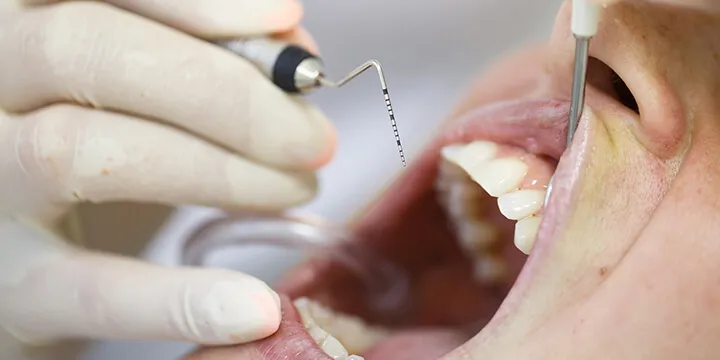
- Share on Facebook176
- Share on Pinterest
- Share on Twitter
When we think about heart disease risk factors, several things come to mind. An obvious one is an unhealthy diet. We all know that if we dine regularly on fast food and processed snacks, risks to our heart health skyrocket. Another is inactivity. If we are sedentary, our hearts do not get the exercise they need to stay strong.
Nearly everyone knows about poor diet and lack of exercise as heart disease risk factors. However, there are some less obvious factors that may increase your chances of suffering a cardiac incident. One that you may not have heard of has to do with your dental health.
Yes, you read that correctly. The health of your teeth and gums may affect the health of your ticker. There is a substantial body of research linking periodontitis, an inflammatory infection of the area around the tooth, to a potentially higher risk of heart complications, including heart disease and heart attack.
Research links periodontitis and heart disease

While it is not scientifically established that periodontitis causes heart disease, the links between the two conditions are well documented. The following is a sample of some of the more recent research:
A 2014 study published in the Journal of Clinical Periodontology analyzed a group of 317 people with both coronary heart disease and periodontitis. On the background of the study, the authors explained:
“This study assessed the possible association between specific clinical parameters of periodontitis and systemic biomarkers of coronary heart disease risk in coronary heart disease patients with periodontitis.”
Results of their analysis showed an inflammatory connection between periodontitis and heart disease. The authors wrote:
“In coronary heart disease patients with periodontitis, BOP [bleeding on probing] is strongly associated with systemic CRP [C-reactive protein, a marker of inflammation] levels; this association possibly reflects the potential significance of the local periodontal inflammatory burden for systemic inflammation.”
More research documents the link
Another 2014 study, published in the European Journal of Preventative Cardiology, surveyed a relatively large number of people (just under 16,000) with chronic cardiovascular disease. Researchers gave participants questionnaires regarding their lifestyles. Then they underwent physical exams. Researchers also took blood samples. On their results, the study authors wrote that “Gum bleeding was associated with higher LDL cholesterol and systolic blood pressure.”
The researchers also wrote:
“Self-reported indicators of PD [periodontal disease] were common in this chronic CHD [coronary heart disease] population and were associated with an increasing socioeconomic and CV [cardiovascular] risk factor burden.”
Chronic infections may increase risk of heart disease

On the relationship between periodontal disease and cardiovascular disease, the authors of a 2015 study published in the journal Innate Immunity wrote:
“Chronic infections may contribute to the systemic inflammation and enhance the risk for CHD [coronary heart disease]. Periodontitis is one of the most common chronic infections that affects up to 50 percent of the adult population. Under inflammatory conditions, the activation of endogenous degradation pathways mediated by immune responses leads to the release of destructive cellular molecules from both resident and immigrant cells.”
So, while we don’t have all of the information needed to form a causal link, the connection between periodontitis and heart disease is indeed troubling.
What we can do
Although experts need to do more research, the simple thing we can do now is to take better care of our teeth! In her Boston University School of Medicine thesis, Nicole Caron states:
“A simple dental cleaning may be important to detect the start of periodontal disease. Treatment can be initiated to end the potential spread of bacteria. It is important to maintain positive oral health in order to maintain overall systemic health, including the avoidance of heart disease.”
Wise words! Taking care of our oral health is highly important. It may even help protect your heart.
– Tanya Mead
- Share on Facebook176
- Share on Pinterest
- Share on Twitter

